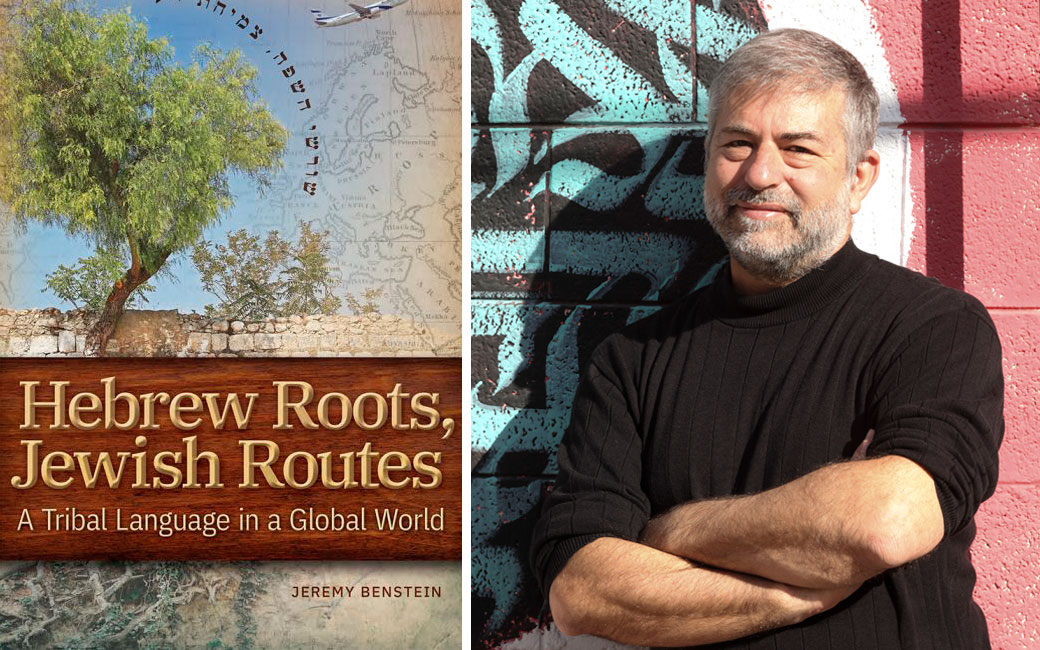The root of it all
Baltimore Hebrew Institute welcomes Jeremy Benstein for the biannual Shoubin Lecture series
By Diane Seegull & Rebecca Kirkman on April 1, 2021

Israeli writer Etgar Keret said, "Hebrew is this unique thing that you cannot translate to any other language. It has to do with its history."
This idea is at the center of the Sraiah and Chana Shoubin Lecture, a biannual lecture series hosted by the Baltimore Hebrew Institute (BHI) at Towson University.
For 25 years, the lecture series has highlighted how the Hebrew language is reflected in literature and art and thereby ties the Jewish people to their traditions.
On April 12, at 12 p.m., the BHI welcomes guest lecturer Jeremy Benstein for a discussion of the Hebrew language's role in Jewish history, identity and peoplehood.
An educator, author and Hebrew lover, Benstein is the author of the 2019 book “Hebrew Roots, Jewish Routes: A Tribal Language in a Global World,” published by Behrman House. He holds a bachelor’s in linguistics from Harvard, a master’s degree in Judaic studies from the Schechter Institute in Jerusalem and a doctorate in cultural anthropology from the Hebrew University.
“I often start lectures by saying the Hebrew language is special because it's one of the oldest languages in continual use, going back 3,000 years,” Benstein says. “But it was re-vernacularized about 140 years ago, which also makes it one of the newest languages.”
This dichotomy of old and new makes Hebrew an important part of the Jewish identity, Benstein adds.
“For close to 2,000 years it wasn't spoken as a vernacular language. It wasn't dead, but for 2,000 years nobody said, ‘pass the salt’ in Hebrew,” he explains. “As the late great Israeli author Amos Oz once said, we know Hebrew was revived when the first Israeli teenage boy said to a teenage girl ‘I love you’ in Hebrew.”
Benstein grew up in the Midwest and was fascinated with language from an early age. In 1978, he spent a gap year in Israel with Machon Le Madrichim (Institute for Youth Leaders) to educate and strengthen youth leadership with a focus on Israel. After that experience, Benstein decided that he would eventually emigrate to Israel, where he still resides.
As an educator, Benstein has found that when it comes to learning the Hebrew language, people take an all or nothing approach. However, he feels that even a basic knowledge enables Jews to better connect with Jewish culture. By learning the roots of the language, one can expand their connection to the people, Jewish tradition and its history.
Benstein’s love for the Hebrew language and his desire to keep it accessible and relevant to Jews ties directly to the mission of the Shoubin Lecture Series.
It was established in 1996 by Shoshana Shoubin Cardin, the daughter of Sraiah and Chana Shoubin and an active leader and philanthropist for Jewish organizations worldwide.
Her parents devoted their lives to revitalizing the Hebrew language, saw the sacredness and majesty of the language and wanted to share that with others.
Born in Eastern Europe, Sraiah fell in love with the Hebrew language upon emigrating to Palestine, now Israel, after World War I. At the time, it was beginning to transition from primarily a written language to a spoken language, thanks to pioneers such as Eliezer Ben-Yehuda who created the first modern Hebrew dictionary.
“It was the time when the Hebrew language was beginning to flourish. It was being resurrected from the dead. And there was a spiritual component just speaking Hebrew, because it meant the Jewish people were returning to their homeland, no longer in diaspora or condemned to exile,” says Rabbi Nina Beth Cardin, granddaughter of Sraiah and Chana Shoubin.. “I think that influenced their love of Hebrew for the rest of their lives.”
After seven years devoted to helping establish Israel, the Shoubins immigrated to the United States. Sraiah's love for the Hebrew language, however, did not diminish. Sraiah and Chana were self-educated, and Sraiah taught Hebrew in the Baltimore area for most of his life and contributed articles to “Ha-Doar,” the American Hebrew weekly. He saw the spiritual component of the language and was drawn to fostering Jews’ connection to it. As part of his efforts, he formed “Chug Ivri,” a Hebrew-speaking group for people in Baltimore to speak Hebrew together.
Cardin recalls how her grandparents infused the love of the Hebrew language into their lives. She remembers the many times her grandfather would talk about the root of a Hebrew word and how it relates to its meaning. For example, the Hebrew word for charity is “Tzedakah” and can also be translated as justice.
Cardin says that when speaking publicly, her mother incorporated Hebrew phrases because of her belief that Hebrew is an anchor that unifies the Jewish people.
Initially the Shoubin lecture series was conducted entirely in Hebrew, but to reach a broader audience, subsequent lectures have been conducted in English.
The Sraiah and Chana Shoubin Lecture
Join the Baltimore Hebrew Institute for a discussion of the Hebrew language's role in Jewish history, identity and peoplehood.
“Hebrew Roots, Jewish Routes: A Tribal Language in a Global World”
Jeremy Benstein, Ph.D.
April 12, 2021, 12 p.m.
Online via Zoom; pre-registration is required for this free event.